Fears Russia will not be able to pay its debts remain
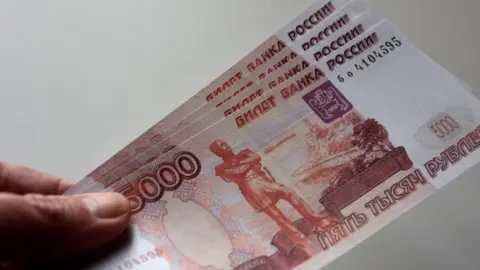 Getty Images
Getty ImagesRussia has claimed it has made a key interest payment to international investors and avoided a debt default.
Western sanctions were imposed on Russia in the wake of its invasion of Ukraine, freezing its access to its foreign currency reserves.
Russia says it has made $117m payments on two dollar-denominated bonds, but investors have not yet reportedly been paid.
If the payments are not made by 30 April, then Russia would be in default.
In announcing that Russia had made the debt payment, Russian finance minister Anton Siluanov said he was not sure if money would go through because of sanctions.
"We have the money, we have made the payment, now the ball is in the court, primarily, of the American authorities."
The US Treasury Department has said that current sanctions would not stop Russia from paying this bill.
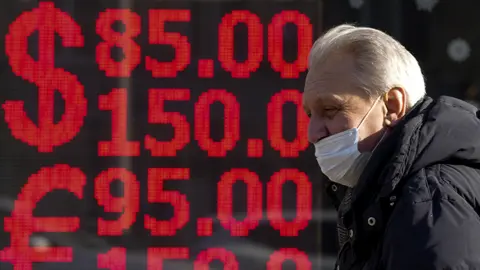 Getty Images
Getty ImagesDespite the confusion, if the debt is not ultimately paid by the end of the 30-day grace period, then Russia will have defaulted on its debts.
Credit ratings agencies have warned that a Russian debt default is "imminent".
Why might Russia not be able to pay its debts?
The Russian government - and firms such as Gazprom, Lukoil and Sberbank - owe about $150bn to overseas investors.
Most of this is in either dollars or euros, and interest and repayments must be made in those currencies.
But sanctions imposed after Russia's invasion of Ukraine mean it has lost access to a large proportion of its $630bn (£470bn) in foreign currency reserves.
However, it still receives dollars for the oil, gas and other things it sells abroad, and that foreign currency is accessible.
If Russia does default, it would be its first debt default since 1998.
It would also be its first default on a foreign-currency debt since the 1917 revolution when the new Bolshevik government refused to recognize the debts of the last tsar.
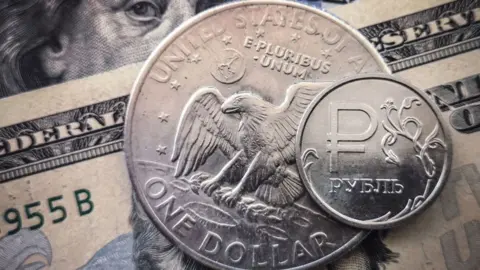 Getty Images
Getty ImagesIf Russia pays in roubles is this still a default?
Russia could try to pay in roubles. Its foreign ministry has said it would pay international investors in roubles if it were stopped from paying them in dollars or euros.
Most of Russia's debts need to be paid in dollars or euros, but debt agreements do allow for different currencies to be used - in which case paying in roubles could be acceptable.
This would depend on whether the rouble payment was judged to be the same value as the original dollar or euro amount investors were expecting.
What does this mean for banks or countries who are owed money?
Investors in Russia have seen the value of their investments slump in recent days.
The problem for many will have been the swiftness of Russia's fall from financial grace, which has left them with little time to react by selling-off their holdings.
Credit ratings agency Moody's says that in its 21-point ratings scale, which indicates how reliable a country is as a place to invest, Russia's rating is at its second-lowest, and could fall still further.
Moody's says this rating means that it expects Russia to default, and that it is warning investors in Russia that they could lose between 35% and 65% of their money.
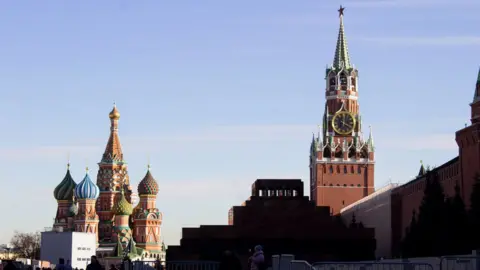 Getty Images
Getty ImagesWhat will this mean for the global economy?
The last time Russia defaulted - in 1998 - it sent shocks through the financial markets. A default now would be hugely symbolic but is "unlikely to have significant ramifications," says Capital Economics chief economist William Jackson.
The IMF has said it will downgrade its forecast of 4.4% global economic growth in 2022 as a result of the war. However, IMF head Kristalina Georgieva has also discounted the idea of a wider shock to the global financial system from a Russian default.
But she warned that the sanctions imposed on Russia would lead to a "deep recession" there, and that the war would drive up global food and energy prices.
The unknown factor, as yet, is what debt defaults there may be by Russian firms - and what impact these may have on overseas investors who have heavily invested in Russia.
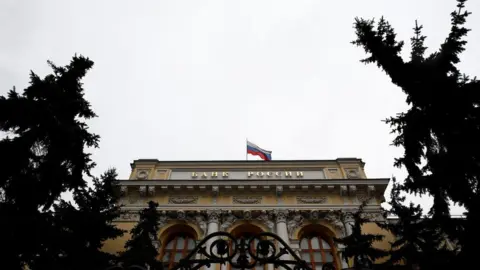 Getty Images
Getty ImagesWhat impact will defaulting on its debts have on Russia?
Any debt default is likely to exacerbate Russia's financial and economic problems.
Before it invaded Ukraine, Russia was considered one of the most creditworthy countries in the world, with low debt levels. But things have dramatically changed.
Foreign firms have left in droves, and Moscow has already imposed strict credit controls to limit the outflow of money in order to protect its economy and the rouble.
Despite this, Russia's economy is set to shrink 7% this year as a result of sanctions.
Inflation in February was already 9.15% before the invasion of Ukraine. It is now forecast to surge significantly this year - despite Russia's central bank raising interest rates from 9.5% to 20%.
